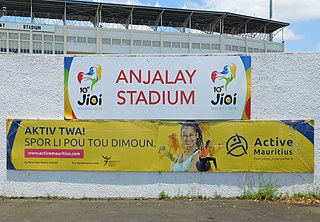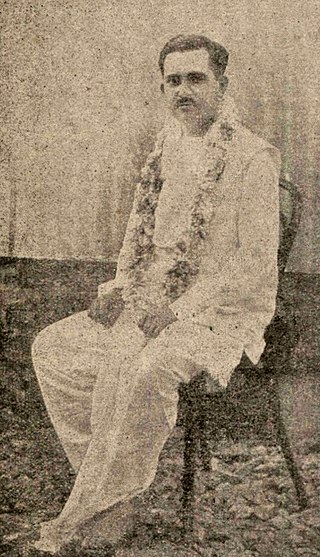Related Research Articles

Mauritius, officially the Republic of Mauritius, is an island nation in the Indian Ocean, about 2,000 kilometres off the southeastern coast of East Africa, east of Madagascar. It includes the main island, as well as Rodrigues, Agaléga, and St. Brandon. The islands of Mauritius and Rodrigues, along with nearby Réunion, are part of the Mascarene Islands. The main island of Mauritius, where the population is concentrated, hosts the capital and largest city, Port Louis. The country spans 2,040 square kilometres (790 sq mi) and has an exclusive economic zone covering 2,300,000 square kilometres.
The known and sometimes formally documented history of Mauritius begins with its possible discovery by Austronesians under the Austronesian expansion from pre-Han Taiwan, circa 1500 to 1000 BC, and then by Arabs,, followed by Portuguese and its appearance on European maps in the early 16th century. Mauritius was successively colonized by the Netherlands, France and Great Britain, and became independent on 12 March 1968.

Sir Seewoosagur Ramgoolam, often referred to as Chacha Ramgoolam or SSR, was a Mauritian physician, politician, and statesman. He served as the island's only chief minister, first prime minister, and fifth governor-general.

Sir Abdool Razack Mohamed was an Indian-born former senior minister in the pre and post-independence cabinet of Mauritius.
Sookdeo Bissoondoyal was a Mauritian politician and one of the leading figures in the nation's independence movement.
Indo-Mauritians are Mauritians who trace their ethnic ancestry to the Republic of India or other parts of the Indian subcontinent in South Asia.

Mauritius was a Crown colony off the southeast coast of Africa. Formerly part of the French colonial empire, British rule in Mauritius was established de facto with the Invasion of Isle de France in November 1810, and de jure by the subsequent Treaty of Paris. British rule ended on 12 March 1968, when Mauritius became independent.
The Muslim Committee of Action, also known as the Comité d'Action Musulman or Comité d'Action Mauricien (CAM) was a political party in Mauritius.
The following is a timeline of the history of the city of Port Louis on the island of Mauritius.
Maurice Curé (1886-1977) was one of the founders of the Labour Party in Mauritius in 1936.

The 1943 Belle Vue Harel Strike refers to a significant strike which escalated into riots amongst labourers working in the fields of the Belle Vue Harel Sugar Estate, near the village of Belle Vue Harel on the island of Mauritius in September 1943. The riots led to the death of 4 people with an additional 16 people being injured.

Basdeo Bissoondoyal was a Mauritian social worker, educator and writer who played an important role in the pre-Independence politics and independence movement on the island of Mauritius. He is also sometimes referred to as "Pandit Basdeo Bissoondoyal" or "Professor Basdeo Bissoondoyal".
Sir Satcam Boolell GCSK QC was a Mauritian politician who served as member of the Legislative Assembly in Mauritius. He died on March 23, 2006, in Curepipe. He was also known as "Somduth" by his peers and family members.
Harisun Boodhoo more commonly known as Harish Boodhoo, is a Mauritian political figure who served as Deputy Prime Minister of Mauritius from 11 June 1982 to 21 August 1983. He was elected Member of Parliament (MP) in 1976, 1982 and 1983 in Rivière des Anguilles and Souillac.
The Independent Forward Bloc (IFB) was a political party in Mauritius.
Sir William Newton (1842-1915) was a Mauritian lawyer and politician who was elected in British Mauritius to the Council of the Government of Mauritius, the predecessor of modern-day National Assembly or Parliament.
Socio-Cultural Group is a term which is used on the island of Mauritius to refer to private organisations whose primary objectives are to consolidate human and moral values, strengthen the family unit and promote religious and cultural values. These groups are also known as socio-cultural movements or socio-cultural associations.
Bikramsingh Ramlallah (1915-2000), also known as Beekrumsingh Ramlallah, Beekrum Ramlallah, or Vikram Ramlallah, was a Mauritian school teacher, social worker, activist, journalist, politician and minister.
Abdool Wahab Foondun was a Mauritian politician who was active both before and after the Independence of Mauritius.
References
- ↑ Bissoondoyal, Surendra. "Basdeo Bissoondoyal, the fire within 13-April-2006". L'Express. Retrieved 9 September 2024.
- ↑ Peerthum, Satyendra. "The Historic Jan Andolan and its Sources of Inspiration 02-May-2023". Le Mauricien. Retrieved 9 September 2024.
- ↑ Peerthum, Satyendra. "The Historic Jan Andolan and its Sources of Inspiration 02-May-2023". Le Mauricien. Retrieved 9 September 2024.
- ↑ Peerthum, Satteeanund; Peerthum, Satyendra. "The work of a Gandhian missionary 19-April-2005". L'Express. Retrieved 9 September 2024.
- ↑ Bissoondoyal, Surendra. "Basdeo Bissoondoyal, the fire within 13-April-2006". L'Express. Retrieved 9 September 2024.